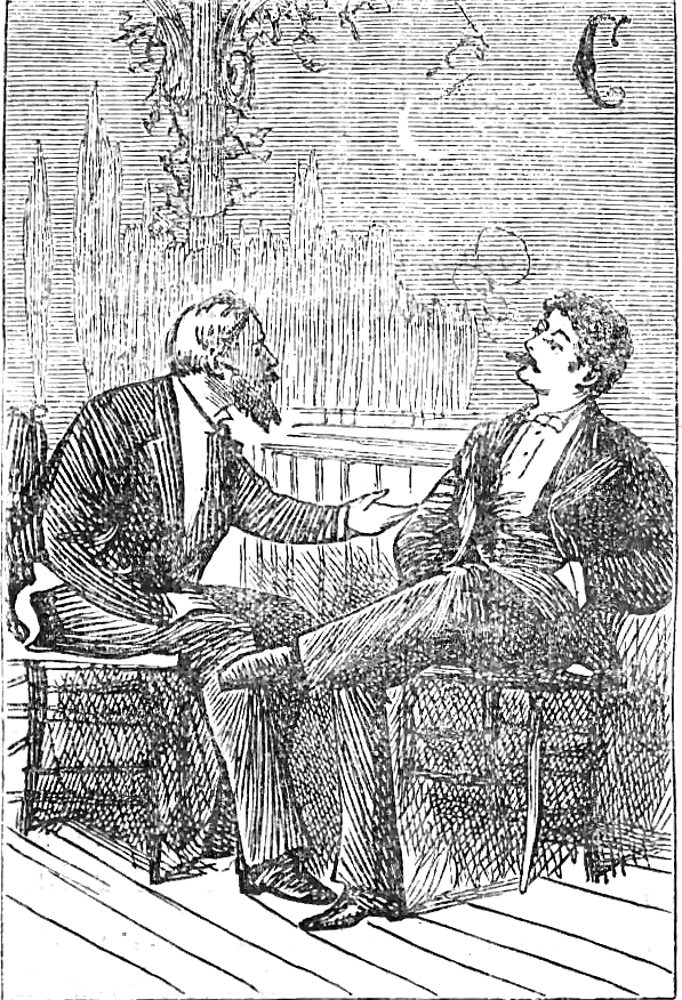

Initial letter C: he muttered his polite congratulations by Sir Luke Fildes; engraver, Swain. Fifteenth initial-letter vignette for Charles Lever's Lord Kilgobbin, from the December 1871 number of the Cornhill Magazine, p. 738 in Vol. XXIV. 7.5 cm by 5.0 cm (3 by 2 inches), framed. Part 15, Chapter LXII, "With a Pasha." The wood-engraver responsible for this thumbnail illustration was Joseph Swain (1820-1909), noted for his engravings of Sir John Tenniel's cartoons in Punch. [Click on the image to enlarge it; mouse over links.]

Right: The title-page for Volume XXIV of the Cornhill Magazine (July-December, 1871).
This initial-letter vignette is based on a passage in Ch. 62, "With a Pasha"
A telegraphic despatch in cipher was put into his hands as he was reading. It was from Lord Danesbury, and said: "Come back as soon as you can, but not before making K. Pasha know his fate is in my hands."
As the Grand-Vizier had already learned from the Ottoman ambassador at London the news that Lord Danesbury was about to resume his former post at Constantinople, his Turkish impassiveness was in no way imperilled by Atlee’s abrupt announcement. It is true he would have been pleased had the English Government sent out some one new to the East and a stranger to all Oriental questions. He would have liked one of those veterans of diplomacy versed in the old-fashioned ways and knaveries of German courts, and whose shrewdest ideas of a subtle policy are centred in a few social spies and a "Cabinet Noir." The Pasha had no desire to see there a man who knew all the secret machinery of a Turkish administration, what corruption could do, and where to look for the men who could employ it.
The thing was done, however, and with that philosophy of resignation to a fact in which no nation can rival his own, he muttered his polite congratulations on the event, and declared that the dearest wish of his heart was now accomplished.
"We had half begun to believe you had abandoned us, Mr. Atlee," said he. "When England commits her interests to inferior men, she usually means to imply that they are worth nothing better. I am rejoiced to see that we are, at last, awakened from this delusion. With his Excellency Lord Danesbury here, we shall be soon once more where we have been."
"Your fleet is in effective condition, well armed, and well disciplined?"
"All, all," smiled the Pasha. [Cornhill, Vol. XXIV, 647; page 344 in volume]
Commentary: Joe Atlee Makes a Palpable Hit with Kulbash Pasha at "Stambul"
Early in Chapter LVIII, "In Turkey," Lever analyzes the nature of the diplomatic problems that Joe Atlee faces as Lord Danesbury's confidential agent: he must secure the continuing loyalty of Kulbash Pasha and uncover any blunders made by his former underling at the embassy, Sam Brumsey, all the while tracking down the Greek spy, the scoundrel Speridionides, and retrieving Danesbury's correspondence. He apparently succeeds in establishing a friendly working relationship with Danesbury's Turkish confidant in the previous serial instalment:
In a word, Atlee saw that he was to personate the character of a most unsuspecting, confiding young gentleman, who possessed a certain natural aptitude for affairs of importance, and that amount of discretion such as suited him to be employed confidentially; and to perform this part he addressed himself.
The Pasha liked him so much that he invited him to be his guest while he remained at Constantinople, and soon satisfied that he was a guileless youth fresh to the world and its ways, he talked very freely before him, and affecting to discuss mere possibilities, actually sketched events and consequences which Atlee shrewdly guessed to be all within the range of casualties. [Chapter LVIII, "In Turkey," 323 in volume]
Again, Lever's personal and professional experiences inform the plot and characterization as the novelist had himself served in the British diplomatic corps in Italy. He had been, a dozen years before writing Kilgobbin, the British Vice-Consul in La Spezia, and from 1867 had been Consul at Trieste. In this chapter, political affairs in London have forced Danesbury's resignation as Lord Lieutenant of Ireland, and he is about to return to the post that he held before in Constantinople: Lever makes all these diplomatic and political maneuverings perfectly intelligible.
Scanned images and text by Philip V. Allingham. [You may use these images without prior permission for any scholarly or educational purpose as long as you (1) credit the person who scanned them and (2) link your document to this URL in a web document or cite the Victorian Web in a print one.]
Bibliography
Lever, Charles. Lord Kilgobbin. The Cornhill Magazine. With 18 full-page illustrations and 18 initial-letter vignettes by S. Luke Fildes. Volumes XXII-XXV. October 1870-March 1872.
Lever, Charles. Lord Kilgobbin: A Tale of Ireland in Our Own Time. With 18 Illustrations by Sir Luke Fildes, R. A. London: Smith, Elder, 1872, 3 vols; rpt., Chapman and Hall, 1873.
Lever, Charles. Lord Kilgobbin. Illustrated by Sir Luke Fildes. Novels and Romances of Charles Lever. Vols. I-III. London: Smith, Elder, 1872, Rpt. London: Chapman & Hall, 1873, in a single volume. Project Gutenberg. Last Updated: 19 August 2010.
Stevenson, Lionel. Chapter XVI, "Exile on the Adriatic, 1867-1872." Dr. Quicksilver: The Life of Charles Lever. New York: Russell and Russell, 1939; rpt. 1969. Pp. 277-296.
Sutherland, John A. "Lord Kilgobbin." The Stanford Companion to Victorian Fiction. Stanford, Cal.: Stanford U. P., 1989, rpt. 1990, 382.
Created 10 June 2023 Updated 3 July 2023